European Convention on Human Rights
The Convention for the Protection of Human Rights and Fundamental Freedoms, better known as the European Convention on Human Rights (ECHR), was drafted by the Council of Ministers in November 1950 and came into force in 1953. It was drafted as a way of ensuring the horrors and abuses of world war two were never repeated by outlining fundamental rights and freedoms that would be respected and enjoyed by all citizens equally.

Section one of the ECHR contains the articles relating to rights and freedoms, including
- Art. 2) the right to life;
- Art. 3) the prohibition on torture and inhuman or degrading treatment;
- Art. 4) the prohibition of slavery and forced labour;
- Art. 5) the right to liberty and security;
- Art. 6) the right to a fair trial;
- Art. 7) no punishment without law;
- Art. 8) the right to respect for private and family life;
- Art. 9) Freedom of thought, conscience and religion;
- Art. 10) freedom of assembly;
- Art. 11) freedom of assembly and association;
- Art. 12) right to marry;
- Art. 13) right to an effective remedy;
- Art. 14) Prohibition of discrimination.
The European Court of Human Rights (ECtHR), based in Strasbourg, was established in 1959 as the international court to adjudicate and implement the convention. Individuals or states can petition the court alleging violations of the rights protected in the convention. The ECtHR has made a number of important judgements concerning the conflict in this jurisdiction, including the failure of the state to properly investigate deaths involving state actors (the ‘procedural obligation’ enshrined in Art. 2).
In 1978 the Strasbourg court ruled on the first inter-state case brought by the Irish government against the British government alleging torture, inhuman and degrading treatment against 14 internees in 1971 known as “the hooded men.” The ECtHR held that the treatment was inhuman and degrading, but stopped short of constituting torture1. Declassified government documents found by the PFC and RTE suggest that important evidence was withheld from the ECtHR, and has resulted in the Irish government asking the court in 2014 to revise the original judgement and find that the treatment did, in fact, amount to torture. The ECtHR has not yet ruled on whether this application is admissible.
- 1. ttp://hudoc.echr.coe.int/eng#{"itemid":["001-57506"]}
